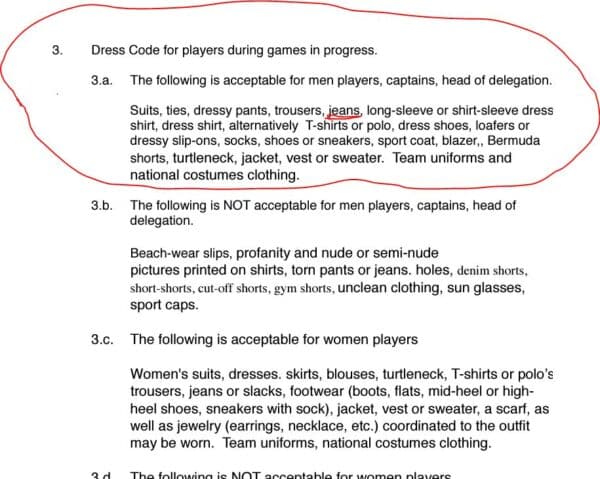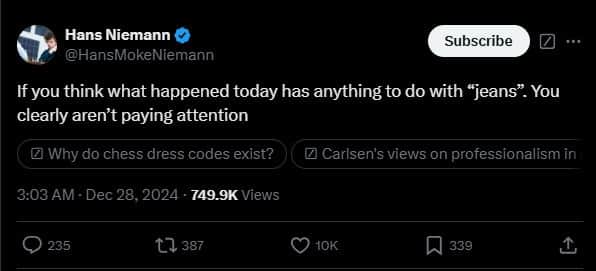The chess world was recently shaken by Magnus Carlsen’s withdrawal from the 2024 World Rapid Chess Championship. The official reason? A dispute over dress code violations. But as I delved deeper, it became clear this incident wasn’t just about clothing—it hinted at deeper tensions bubbling beneath the surface.
Carlsen arrived at the tournament wearing jeans—not a swimsuit or casual shorts, but a standard, ordinary pair of jeans. FIDE’s dress code rules, as outlined in their official guidelines, do allow jeans, provided they are “neat, clean, and in good condition.” This begs the question: Was this really about the jeans, or something more personal?

From my perspective, enforcing overly rigid rules—especially when the official dress code appears to allow for some flexibility—is counterproductive. Players need to feel comfortable to perform at their best, and Carlsen’s jeans certainly don’t seem unprofessional.
That said, rules are rules. Even the world’s top player isn’t above them.
What I Teach My Students
As a coach who mentors young chess players, I emphasize the values of perseverance and resilience. I teach my students to never quit a tournament, no matter how challenging the circumstances may be. Each game, even in the face of setbacks, is an opportunity to learn and grow.
Carlsen’s decision to withdraw from the event has sparked difficult questions among my students. One of them asked during a recent session, “If I’m not playing well, isn’t it okay to withdraw from a tournament? If Carlsen does it, can’t I do it too?”
This presented a valuable teaching moment. I explained that while Carlsen’s actions stem from a unique set of circumstances—both personal and professional—our focus as growing players must be on commitment and grit. Even when the odds feel stacked against us, staying the course builds the kind of character that defines champions. Carlsen’s decision may reflect his broader frustrations with chess governance, but for most players, resilience and finishing what we start are vital lessons that prepare us for success, both in chess and in life.

Would Magnus Have Withdrawn if He Had Been Leading?
But would Magnus have withdrawn if he had been leading the tournament? If his score had put him in the top position, would he have set his “principles” aside and focused on competing?
Context matters, though. It’s no secret that Carlsen and FIDE have a long-standing, strained relationship. Hans Niemann even remarked that anyone who believes this was purely about jeans doesn’t understand the situation. This incident appears to be yet another chapter in the ongoing conflict between a chess genius and the sport’s governing body.

Whether this was a FIDE-wide policy failure or the result of an individual arbiter’s strict interpretation, one thing is clear: this incident has sparked important debates about the role of rules in chess tournaments and the balance between professionalism and practicality.



